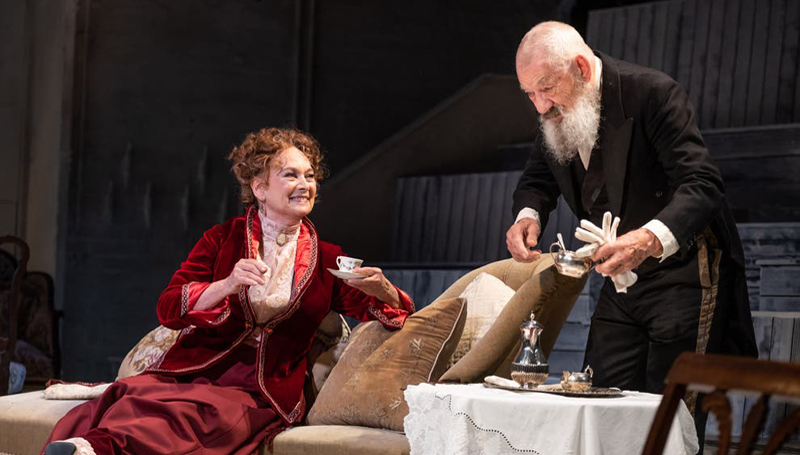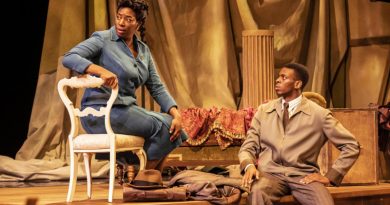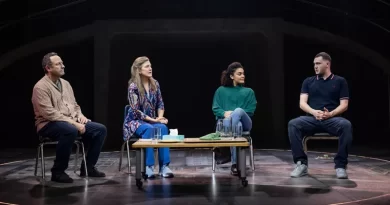“The Cherry Orchard”, Theatre Royal, Windsor
Jeremy Malies in Berkshire
14 October 2021
It’s a truism among Anton Chekhov diehards that Firs in The Cherry Orchard should be as old as possible, because that’s the logical way to make the part moving. You might think that at 82, Sir Ian McKellen is a stripling for the role; earlier in the same season, also at Theatre Royal Windsor, he played … err … Hamlet. You would be right. Chekhov envisaged an 87-year-old.
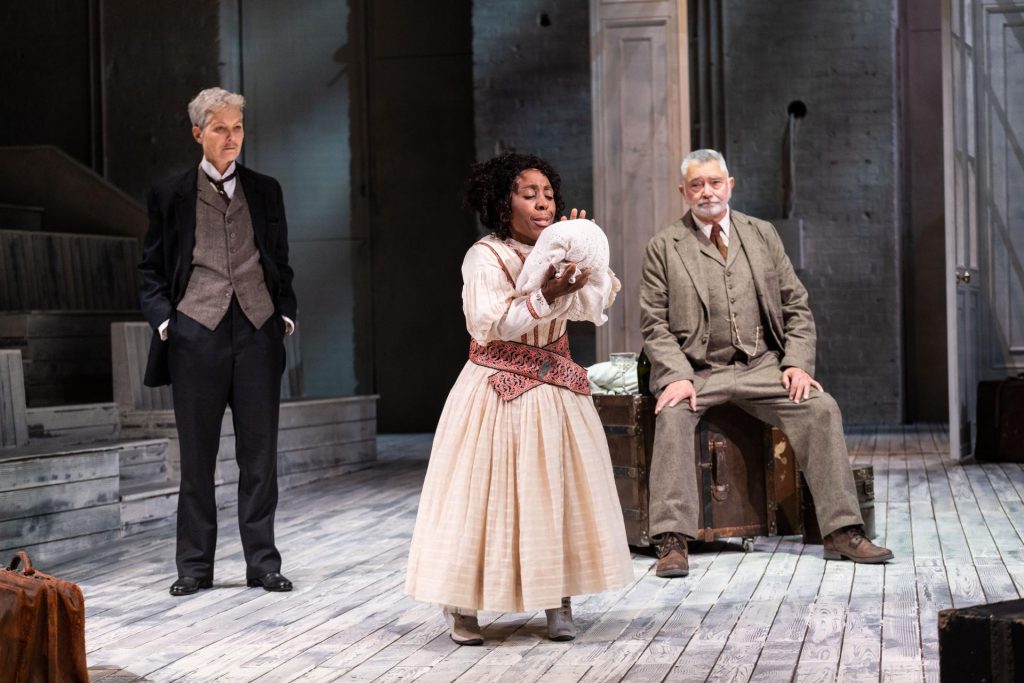
Jenny Seagrove, Alison Halstead and Martin Shaw.
Photo credit: Jack Merriman.
The Cherry Orchard at Theatre Royal Windsor is not focusing on star or celebrity casting but on old-fashioned repertory practice where a principal member will deliberately take a minor role as part of a group endeavour. A less skilful actor would, even if unintentionally, have sucked air away from the rest of the cast. As it is, McKellen who put in a creditable stint on an exercise bike as Hamlet now totters about – sometimes causing alarm that he may indeed be about to take a fall – while he fusses over his beloved Madame Ranevskaya (Francesca Annis.)
Annis makes little impression as the twice widowed and often swindled aristocrat who cannot see that a division of her now anachronistic estate makes financial sense and can save her from ruin. Normally I sympathize with the character and her plea to save the orchard, because the land is synonymous with the memory of her son who drowned here. But this time, none of the usually empathetic dialogue seems to find its mark. Annis is hindered by her colleagues who have little understanding of how to listen on stage and simply fix their interlocutor with a glassy stare and wait for their cue line.
There is a current trend for actors to use their natural accents. McKellen and Martin Shaw (Lopakhin) use their native tones (Lancashire and Birmingham respectively) while Llinos Daniel as a serf – and therefore the most likely to have been born wherever this version is set – greets the picnic party in her own accent which is unmistakably from Cardiff. I understand this is the vogue, but it’s quite a medley. I don’t expect The Cherry Orchard to be set in the Russian provinces in 1904, but if the play is to make any sense there must be hints at recent social upheaval and a pending revolution which Chekhov didn’t live to see but seems to have foreseen. That can only happen if the cast are a credible unit against a recognizable socio-economic environment. Janet Suzman’s version of the play (Free State) sets it in 1994 against a South African farm producing cherry trees with the background being the post-apartheid restoration of democracy. This works well, but anything logical will do and is an improvement on leaving the characters in a void.
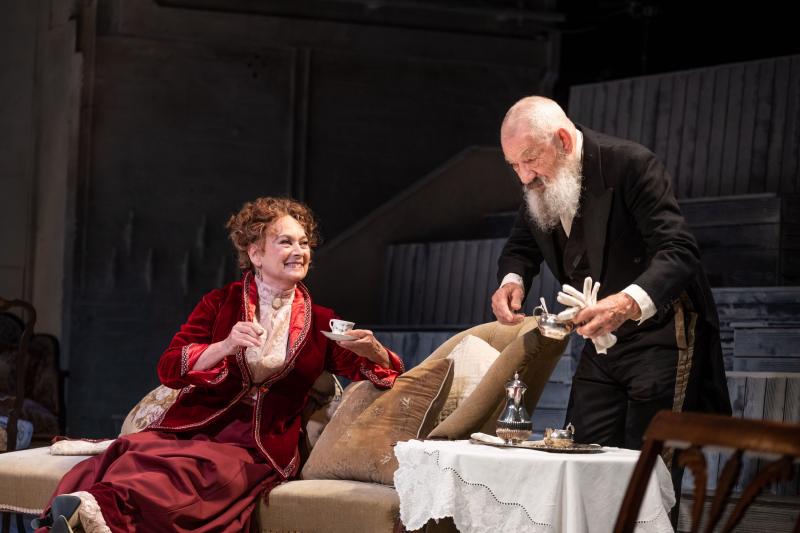
Francesca Annis and Ian McKellen.
Photo credit: Jack Merriman.
Only one character has a backstory, but it misses the mark. The production is age and gender blind and Jenny Seagrove plays the male character Gaev (there is no gender switch) as an androgynous Edwardian dandy who has become obsessed with fin de siècle poetry. Full marks for trying but it’s ludicrous, as is her failure to understand that Gaev’s continual playing of billiard shots on an imaginary table is not conscious but a compulsive nervous tic.
The translator Martin Sherman (it’s a direct translation rather than an adaptation from other English versions) once said about the plays that he himself writes that they are about people who are marginalized from society. His speeches for Charlotta the governess played by Alison Halstead are convincing though of course this also owes much to the actor who is skilful in showing vulnerability. Her conjuring and ventriloquism are often a bore, but here the whole role hits the right bohemian note for this resolutely single woman who is candid about being unfulfilled and lonely.
Other plus points? Ben Allen is outstanding as Trofimov. Shouldn’t we all be eternal students? Allen scores heavily with his rage against intellectuals who never read anything hat might challenge them and his contempt for acquisitive capitalists who devour everything in their path. Equally, he doesn’t buy the idea of the emancipation of the serfs, arguing that they are still oppressed by the wealthy and despised by the intelligentsia. Allen conveys the character’s idealism and ardour effectively.
And what of McKellen? As a team player, he is to be praised. His head is newly shaven, and he sports an extravagant cotton wool beard. The wardrobe is moth-eaten military uniforms that Firs could easily have worn in the Crimean War. There is a great deal of skill directed at keeping the aged servant just about capable of performing his duties while teetering on a calamity as he carries things to and fro. It’s an intriguing study of physical and mental decrepitude. At times he makes cursory nods to the several rows of spectators on stage who of course are hanging on his every movement. Their presence almost made sense in Hamlet as an audience for “The Mousetrap”, but in truth it’s a box office expediency and a distracting one during a performance where the audience was particularly fidgety.
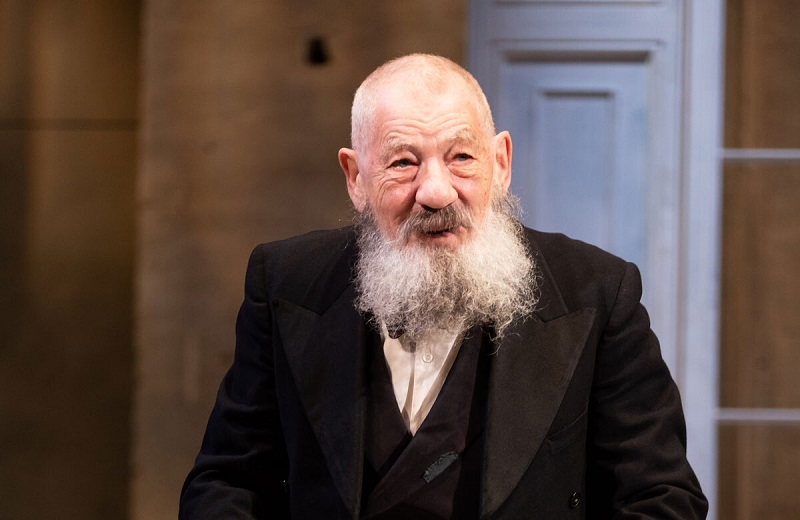
Ian McKellen as Firs.
Photo credit: Jack Merriman.
The tree-cutting in The Cherry Orchard must be among the most difficult sounds to produce in drama. Crucially, it must be created as it would be heard inside the house. Here, joint sound designers Adam Cork and Giles Thomas suggest that nearby Windsor Great Park is crashing to the ground, and several audience members in the stalls appear terrified.
Sherman’s translation is at no times forced or flashy and remains accessible throughout. But the ensemble lets the project down and Mathias, who has directed Uncle Vanya in London and another production of The Cherry Orchard in Los Angeles (trashed by the critics), could usefully realize that while most of the characters in the play are ruthless egotists (hence the comedy), the cast need to connect if a production is to succeed. The Los Angeles production also used this Sherman translation which may have been tweaked since. Actors often cmplain that they find the dialogue in any translation of the play difficult because the characters are so wrapped up in their fantasies that they avoid emotion by changing the subject and are deaf to the problems of others. None of this makes for connections on stage.
Is this a play for our times? There are certainly parallels with Covid which is widening social divides as the rich isolate in their homes while the poor, if they are lucky enough to have a job at all, deliver Amazon parcels to them. And in recent weeks, we have seen growing tension between those with mainstream opinion on the virus and the minority who refuse to be vaccinated. A doctor and also the victim of an infectious respiratory disease (tuberculosis), Chekhov quite possibly would have been intrigued. On the long train journey from Sussex to Berkshire to review this show, I had seen many second home developments of the kind that Lopakhin envisages for the Ranyevskaya estate. I thought later of Lopakhin’s lines, “Once this country was divided into aristocrats and workers. There’s another class of people now and they all want a summer place.” It chimes with the Covid-inspired desire for “staycations”. Surely this has always been a play for our times.

